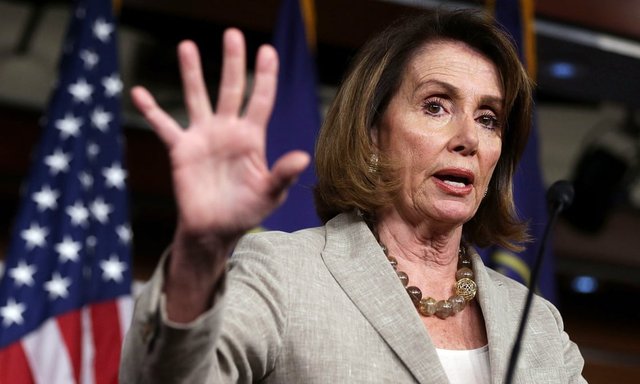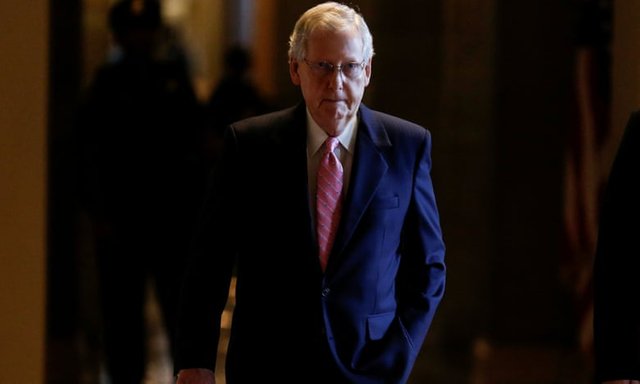Nancy Pelosi leads Democrats into battle again – while watching her back
Donations: http://yourhelpisimportant.blogspot.com/

If it’s the midterms, it must be time for talk about whether the House minority leader must go. Supporters and experts cry foul
Nancy Pelosi was at the podium at the US Capitol, flanked by dozens of female lawmakers, when a reporter asked a familiar question
“Some of your colleagues privately say that your decision to stay on prohibits the party from having a younger leadership and hurts the party in the long run,” said Luke Russert, then a correspondent with NBC News. “What’s your response?”
The women broke into a chorus of boos. “Discrimination! Discrimination!” shouted one.
Russert defend his line of questioning, pointing out that House Democratic leaders were all over 70. Pelosi defended her record working to elect fresh faces, many of them women, to Congress.
“Oh, you always ask that question except to Mitch McConnell,” she said.
That was 14 November 2012, just over a week after Barack Obama won the White House for the second time. Democrats had a majority in the Senate but the House of Representatives was under Republican control.
It was not the first time one of the most powerful women in American politics had been asked if it was time to step aside. Nor would it be the last. Seemingly every two years, as voters head go to the polls, the same debate emerges: are Pelosi’s days numbered, or not?
With two months until the 2018 midterms, the chatter has risen again. Republicans have waged relentless attacks on Pelosi, 78, branding her a “San Francisco liberal”, attempting to tie all Democrats to her.
The party is expected to do well. According to Axios, it is already planning for its time in power. But as many as 50 Democrats on the ballot, including nine incumbents, reportedly will not back Pelosi for speaker if they do retake the House.
To some observers, this illustrates a double standard for women in power. Pelosi’s detractors insist there is a legitimate discussion to be had over ushering in new leadership. But in the Senate, McConnell, the 76-year-old Republican leader who is likely to remain in control, is not faced with similar demands.
“Successful strong women, when they can be demonized, seem to motivate a certain group of voters who are fearful of these successful women,” said Cindy Simon Rosenthal, a professor of political science at the University of Oklahoma and co-author of the 2010 book Speaker Nancy Pelosi and the New American Politics.
“There’s a lot of evidence in social science research of the negative stereotypes associated with older women” as compared with older men, she said. “Women are thought as they age to be more unpredictable, less capable, less cognitively with it, and men are more likely to get a pass.”
Pelosi was elected in 1987 and has long been a target for Republicans. In 2007 she became the only woman ever to serve as speaker, a position she held until 2011. She has been minority leader since then.
Her legislative accomplishments include securing the passage of the Affordable Care Act (ACA) and a stimulus package to revitalize the economy under the Obama administration. She has been heralded for advancing women’s and LGBT rights. She broke with most Democratic leaders by opposing the Iraq war.
She is also a shrewd negotiator and tactician who has held her caucus in line to oppose Republican efforts to repeal the ACA and pass a vast tax overhaul. She remains a prolific fundraiser who brought in nearly $91m through July for the Democratic Congressional Campaign Committee.
Those potentially eyeing the speaker’s gavel do not deny her record.
“I think she will go down as one of the best speakers in the history of the Congress,” said Tim Ryan, an Ohio representative who challenged Pelosi after the 2016 election. “She’s a phenomenal legislator, a phenomenal negotiator. I don’t take that away from her.”
Ryan, who did not rule out another challenge, said it was simply time for the party to rebrand itself at the national level.
“It’s about reconnecting to the American people,” he said, “putting forward a new brand for the party, reconnecting with the workers who have left us in the last few years.
“This isn’t just about this election, it’s about building a long-term sustainable majority that can govern.”
‘Powerful women are either threatening or annoying’
When Ryan last went up against Pelosi, in the wake of Donald Trump’s stunning presidential victory, Democrats voted 134 to 63 in favor of the status quo. The tides had shifted, slightly; in 2014, Pelosi ran unopposed and was re-elected in a unanimous vote despite similar grumblings from some corners.
Now, Democrats are buoyed by Trump’s historically low approval ratings and increasingly optimistic about the prospects of a blue wave in the midterms. In the chaos of Trump’s Washington, they have sought to frame Republicans as complicit in an administration marked by corruption.
Republicans are betting, against the odds, that the midterms will be a referendum on Pelosi. Like her counterparts in congressional leadership, the minority leader holds unfavorable ratings from a majority of Americans. Nonetheless, evidence suggests the Republican attacks are not working.
A recent CNN poll found that only 34% of registered voters said Pelosi would be an extremely or very important factor when they cast their ballots this fall, last on a list of 10 factors.
Kelly Dittmar, an assistant professor of political science at the Center for American Women and Politics at Rutgers University, said Republican attacks on Pelosi echoed the party’s playbook against Hillary Clinton. As the former Democratic presidential nominee was often portrayed as angry or shown in unflattering ways, Dittmar said, Pelosi has become a central focus for Republicans “to demonize and run against”.
“The photos they use or the ways they talk about her … that’s where you see the gender stereotypes about how, for some people, powerful women are either threatening or annoying or whatever that may be,” Dittmar said. “There’s something at the root of that tied to your discomfort of women in powerful positions.”
Dittmar said it was not inherently gendered for there to be a conversation about injecting new faces into party leadership. But it was difficult to isolate gender from the fixation on Pelosi at a time when considerably less attention has been given to the open race to replace the House speaker, Paul Ryan, who is retiring.
Cheri Bustos, a representative from Illinois who has led recruitment efforts within the Democratic party, dismissed the obsession over the future of congressional leadership as a media distraction. Voters she encountered, she said, were “more concerned with healthcare or even potholes”.
Bustos said there was “a fair discussion” to be had over who should lead Democrats in the House, if they won a majority.
“That said, I think [Pelosi has] been a remarkable leader and I think she’s been part of a very strong leadership team,” she said.
“Women in politics are judged in a very different way … what our hair looks like, what we’re wearing, how our makeup looks, being judged because we’re moms or we’re grandmas.
“Any woman in higher office has felt it very personally.”
Donations: http://yourhelpisimportant.blogspot.com/
Hi! I am a robot. I just upvoted you! I found similar content that readers might be interested in:
https://www.theguardian.com/us-news/2018/sep/04/nancy-pelosi-house-minority-leader-democrats-midterms